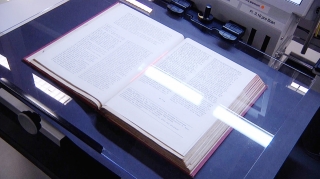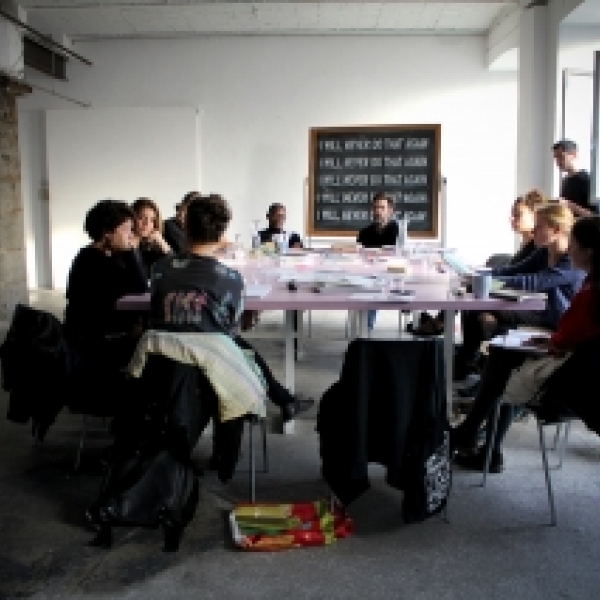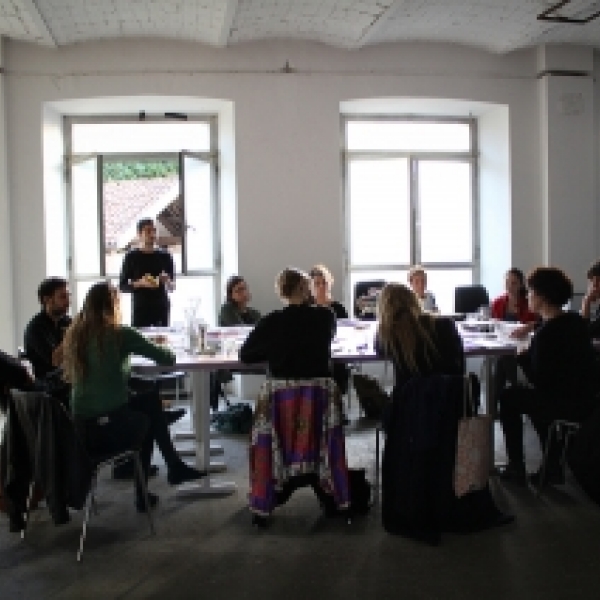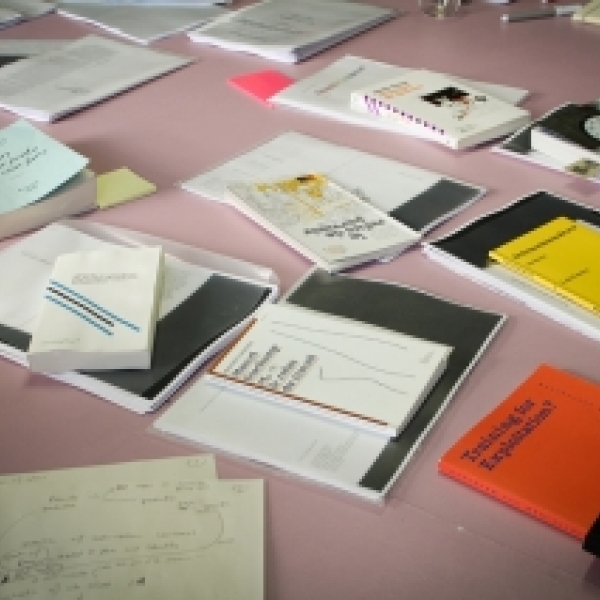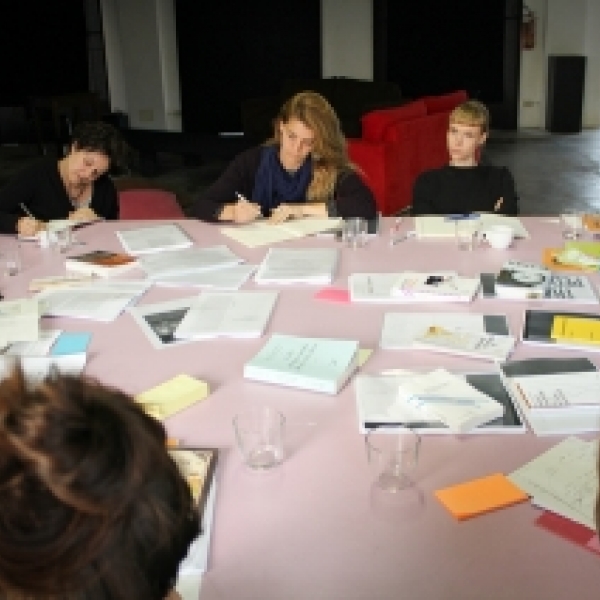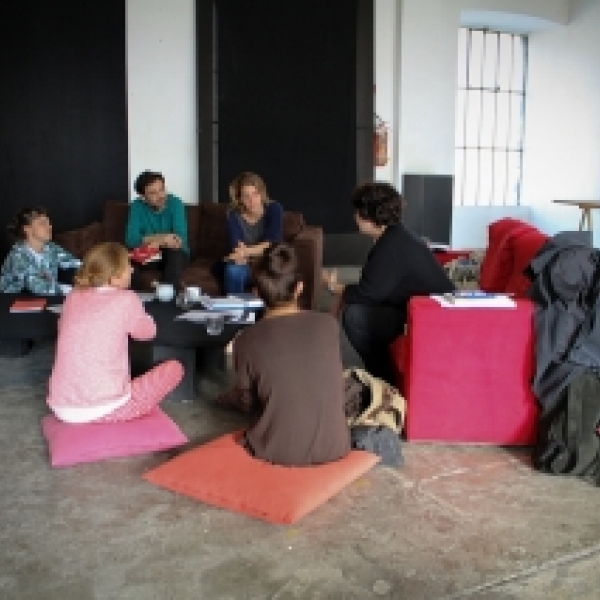And if… Just if… (why the alternative Y did not take place)
The workshop And if… Just if… (why the alternative Y did not take place) is based on the Art Work(ers) research project developed in the framework of the ECAV - Ecole Cantonale d’Art du Valais by Robert Ireland, Petra Köhle and Federica Martini together with invited guests.
The research investigates modes of productivity in the arts and industrial contexts, in resonance with the sites and working situations engaged by Unidee in Biella. The other site is the city of Ivrea, around the Olivetti typing machine industry. Editorial (Edizioni di Comunità) and educational processes were at the centre of the production mode. Books such as La condition ouvrière by Simone Weil were translated, not only for the sake of patronage or pedagogical emancipation of the workers, but rather to support the reflection on labour and production in social and cultural terms. Already in the 1950s workers were offered a variety of night classes including History of the Workers’ Movement, conducted by the antifascist and anarchist Ugo Fedeli. In this respect, the educational system functioned both as a mediator of historic facts and as an agent to imagine a future.
Considering the Unidee and Olivetti scenarios as an archive of narratives, questions and voices, the methodological starting point of the workshop at Fondazione Pistoletto is to shift from the question of «why x took place» to the question of «why the alternative Y did not». It implies imagination and the consideration of what we don’t know as being constitutive for experimenting history in order to create alternative narrations for the future.
The workshop will shared research materials, offer screenings, discussions and writing sessions in order to create a platform to experiment together in different formats and to create speculative findings and narrations during the workshop.
SCHEDULE
The programme is based on a series of workshop sessions which include screenings, readings, discussions, presentations and writing.
October 9th
morning
As an introduction to the site we will visit the Cittadellarte, including the Pistoletto, Arte Povera collections and temporary exhibitions curated by Elena Rosina. Cecilia Guida, Head of the Unidee Programs, will introduce the Unidee project.
afternoon
Workshop session: A left production site
What happens when a production site is left? Where are the bodies? What is preserved? What is not? Where does the knowledge goes to? How does it look like? What are the relations to art production?
October 10th
morning and afternoon
Workshop session: Educational and production
What role does the offer of education play within a system of production? What is the productivity of education? What aesthetical impact does it have? What role can art play?
October 11th
morning and afternoon
Workshop session: Art and work
What do we consider to be work and how does it differ from what we do not consider to be work? What is the role of a product? What does dematerialization mean in this context? What role does money play, or a salary? What is the relation to time? Does work need a specific place, space, site?
REFERENCES:
Texts:
• Yuval Noah Harary, Homo Deus, A Brief History of Tomorrow, London: Harvill Secker, 2016.
• Leonardo Sciascia, Il teatro della memoria, Torino: Einaudi, 1981.
• Hito Steyerl, “Can Witnesses Speak, On the Philosophy of the Interview,” 2008. (http://eipcp.net/transversal/0408/steyerl/en)
• Paul Veyne, Writing History: Essay on Epistemology, trans. by Mina Moore.
Videos and films:
• Jean-Luc Godard, Tout va bien, 1972
• Silvia Maglione & Graeme Thompson, Through the letterbox, 2013

BIOGRAPHIES
Federica Martini, PhD, is an art historian and curator. She was a member of the Curatorial Departments of the Castello di Rivoli Museum of Contemporary Art, Musée Jenisch Vevey and Musée cantonal des Beaux-Arts/Lausanne. Since 2009, she has been head of the Master programme MAPS at the ECAV-Ecole cantonale d'art du Valais/Sierre, and is part of the collective standard/deluxe, Lausanne. In 2015-16 she was a research fellow at the Istituto Svizzero di Roma. Recent publications include: PhD Making is my Art Practice (with P. Gisler, SARN, 2017); Vedi alla voce: traversare (2016, Traces); Publishing Artistic Research (with B. Drabble, SARN, 2014); Open Source and Artistic Research (with B. Drabble, SARN, 2014); Tourists Like Us: Critical Tourism and Contemporary Art (with V. Mickelkevicius, 2013); Pavilions/Art in Architecture (with R. Ireland, 2013, Bruxelles: La Muette); Just Another Exhibition: Stories and Politics of Biennials (with V. Martini, 2011, Milan: postmediabooks).
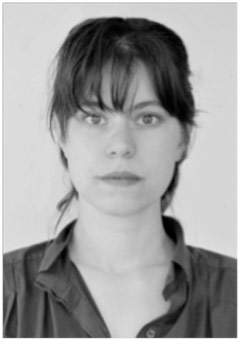
Petra Köhle, artist, develops her work since 2003 in collaboration with Nicolas Vermot-Petit-Outhenin. In stagelike settings they experiment with histories and engage with repetition, translation and transduction, creating spatial and temporal gaps and new scenarios. Their practice include installations, videos, texts, photography, performances and books. Exhibitions/performances at Palais de Tokyo in Paris, Aargauer Kunsthaus in Aarau, Museum of Modern Art Frankfurt, Kunsthaus Glarus, Centre d’Art Contemporain Chanot in Clamart Paris, Shedhalle Zurich, Sinop Biennial in Turkey and during Printed Matter at PS1 in New York. Koehle/Vermot were residents at Istituto Svizzero di Roma and Cité international des Arts de Paris. They have published several books at edition fink, Zurich, such as [f: la répète] and There where I should have been yesterday. I am here today. Petra Koehle is currently research collaborator and lecturer at the MA in Public Spheres, ECAV.
